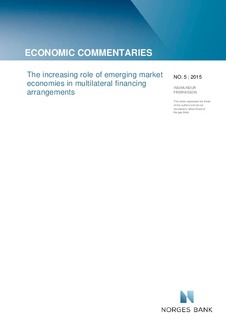| dc.contributor.author | Fridriksson, Ingimundur | |
| dc.date.accessioned | 2018-08-15T07:55:21Z | |
| dc.date.available | 2018-08-15T07:55:21Z | |
| dc.date.issued | 2015 | |
| dc.identifier.uri | http://hdl.handle.net/11250/2558036 | |
| dc.description.abstract | The International Monetary Fund (IMF) and the World Bank were established at the end of the Second World War after a conference in Bretton Woods in New Hampshire in the United States. They are often referred to as the Bretton Woods Institutions (BWIs). Today, the membership of the institutions comprises 188 countries – almost all the countries of the world. They are truly global institutions. Stalemate in implementing changes in the governance of the IMF is among the factors said to have motivated large emerging market economies to establish new multilateral institutions. Thus a brief background will be provided specifically on the IMF. | nb_NO |
| dc.language.iso | eng | nb_NO |
| dc.publisher | Norges Bank | nb_NO |
| dc.relation.ispartofseries | Economic Commentaries;5/2015 | |
| dc.rights | Attribution-NonCommercial-NoDerivatives 4.0 Internasjonal | * |
| dc.rights.uri | http://creativecommons.org/licenses/by-nc-nd/4.0/deed.no | * |
| dc.title | The Increasing Role of Emerging Market Economies in Multilateral Financing Arrangements | nb_NO |
| dc.type | Others | nb_NO |
| dc.description.version | publishedVersion | nb_NO |
| dc.subject.nsi | VDP::Samfunnsvitenskap: 200::Økonomi: 210::Samfunnsøkonomi: 212 | nb_NO |
| dc.source.pagenumber | 11 | nb_NO |

